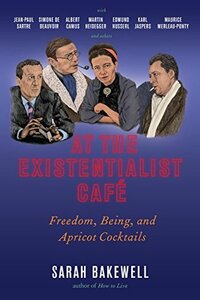Take a photo of a barcode or cover
Doesn't flow too well. I would have liked more description of the specific philosophies and the synergies and contrasts between them than the bios of the individuals. Bakewell makes clear by the end that her interest is more in their lives than their ideas in the abstract, but it's their lives that have made Sartre, de Beauvoir and the rest famous, and I think she could have done a better job of presenting those in the context of history, the mixing in of biographical information muddled that message for me.
informative
inspiring
reflective
medium-paced
Brilliantly written and researched, this book successfully balances the academic with entertainment, summarising philosophical notions without being dull or dry.
The last chapter neatly tied up the loose ends and suggested ways that existentialism could be applied to today's issues that I felt were good arguments and well-expressed.
I'd like to read more of her work.
The last chapter neatly tied up the loose ends and suggested ways that existentialism could be applied to today's issues that I felt were good arguments and well-expressed.
I'd like to read more of her work.
funny
informative
inspiring
reflective
relaxing
medium-paced
Terrific snapshots of so many brilliant thinkers and the contexts that formed them. Took Heidegger to task for his nazism, though could have done more to call out de Beauvoir and Sartre's grooming. Merleau-Ponty needs more love!
challenging
informative
inspiring
reflective
medium-paced
The predominant post-war philosophical “movement” Existentialism, ripe in post-war universities and infused in the artwork of it’s time, is rarely discussed as a vibrant flowering philosophy. In a 1967 New York Times piece (https://timesmachine.nytimes.com/timesmachine/1967/07/30/issue.html), the movement itself was recognized as influential, but largely dismissed by it’s influencers (Sartre, Heidegger, and Jaspers). How the movement came and went is documented in this wonderful work that looks at the biographies, documents and larger culture between the 1910s and early 1970s.
Sarah Bakewell explores the beckoning of existentialism as the “bloom of experience and communication that lies at the heart of the human mystery” (p.677). Her exploration of the two colossi Heidegger and Sartre imagines a re-awakening of our self-perception. The two fundamental questions – who we are; what we should do here – explored in the post-war Europe build new inroads into exploring identity, ethics, gender, and purpose.
Reading this book, I was humbled by the placement of war and violence toward many of the situational ethics explored. Jean Paul Sartre famously wrote “there are two ways to the gas camber – free or not free”. Given the loss of human life experienced by these thinkers in the first world war (notably Husserl) or their relationship to Nazi Germany/occupied France, the loss of freedom is never far from a lived reality. Some of the literature that occupies our imagination now like Camus’s “The Stranger”, “The Plague” or Sartre’s “No Exit” resonates with our own alienation during this current era of pandemics and fractured political unity.
To her credit, Bakewell takes on what existentialism is. No easy task for a group of eclectic thinkers, that were inventing their own language to be unburdened from experience. Concern with the individual, inseparability from anxiety, involvement in personal projects and emphasis on personal responsibility sum of some of the prevailing notions. Although much of the philosophy grow from the phenomenology, responding to life itself, the documents truly range across all academic thought. It’s imprint found in social theory of gender (Simone De Beauvoir’s work), modern catholic thought (Paul Tilch), and artwork (70s movie director auteurs).
The book explores many of these ideas through the vehicle of biography and story. At times I feel lost with her. For instance, I recognized the obfuscating and illuminating language of Heidegger, and also appreciating the assumed question of “being” was being deconstructed. The fevered output and positioning of Sartre takes many forms, but Bakewell identifies an anarchistic humanism at the root of all his messy choices.
Although not discussed here, Austin professor Robert Solomon’s lectures, brilliantly tackle some of the questions of where existentialism is rooted in our post-modern world. Agency and humanity, tenets of existentialism seem to be the very targets of post-structural thought. Technology and authenticity, visible in social media discourse, have proven to be foes at time regarding ethical questions. Our questions over ethics and human existence are being reimagined with new deconstructions of identity in the cultural spheres, and artificial intelligence, which may be recognized as sentient in this century.
Existentialism for myself remains more a promise than a legacy. A flurry of ideas over apricot cocktails in a Bec-De-Gaz bar (p.19) some 100 years ago. But those ideas were never meant to be static, codified or assumed. Like Bakewell, I felt connected to these thinkers, for their engagement with the world, their passions, and their deep stares into the abyss of nothingness.
Maybe there is one historical truth that is laid bare here from their works, that existentialism was never about despair. Existence precedes essence. Being here, being thrown, existing was never a choice. But here we are. Now, what can do we with it.
Sarah Bakewell explores the beckoning of existentialism as the “bloom of experience and communication that lies at the heart of the human mystery” (p.677). Her exploration of the two colossi Heidegger and Sartre imagines a re-awakening of our self-perception. The two fundamental questions – who we are; what we should do here – explored in the post-war Europe build new inroads into exploring identity, ethics, gender, and purpose.
Reading this book, I was humbled by the placement of war and violence toward many of the situational ethics explored. Jean Paul Sartre famously wrote “there are two ways to the gas camber – free or not free”. Given the loss of human life experienced by these thinkers in the first world war (notably Husserl) or their relationship to Nazi Germany/occupied France, the loss of freedom is never far from a lived reality. Some of the literature that occupies our imagination now like Camus’s “The Stranger”, “The Plague” or Sartre’s “No Exit” resonates with our own alienation during this current era of pandemics and fractured political unity.
To her credit, Bakewell takes on what existentialism is. No easy task for a group of eclectic thinkers, that were inventing their own language to be unburdened from experience. Concern with the individual, inseparability from anxiety, involvement in personal projects and emphasis on personal responsibility sum of some of the prevailing notions. Although much of the philosophy grow from the phenomenology, responding to life itself, the documents truly range across all academic thought. It’s imprint found in social theory of gender (Simone De Beauvoir’s work), modern catholic thought (Paul Tilch), and artwork (70s movie director auteurs).
The book explores many of these ideas through the vehicle of biography and story. At times I feel lost with her. For instance, I recognized the obfuscating and illuminating language of Heidegger, and also appreciating the assumed question of “being” was being deconstructed. The fevered output and positioning of Sartre takes many forms, but Bakewell identifies an anarchistic humanism at the root of all his messy choices.
Although not discussed here, Austin professor Robert Solomon’s lectures, brilliantly tackle some of the questions of where existentialism is rooted in our post-modern world. Agency and humanity, tenets of existentialism seem to be the very targets of post-structural thought. Technology and authenticity, visible in social media discourse, have proven to be foes at time regarding ethical questions. Our questions over ethics and human existence are being reimagined with new deconstructions of identity in the cultural spheres, and artificial intelligence, which may be recognized as sentient in this century.
Existentialism for myself remains more a promise than a legacy. A flurry of ideas over apricot cocktails in a Bec-De-Gaz bar (p.19) some 100 years ago. But those ideas were never meant to be static, codified or assumed. Like Bakewell, I felt connected to these thinkers, for their engagement with the world, their passions, and their deep stares into the abyss of nothingness.
Maybe there is one historical truth that is laid bare here from their works, that existentialism was never about despair. Existence precedes essence. Being here, being thrown, existing was never a choice. But here we are. Now, what can do we with it.
Bakewell does a really good job weaving together philosophical ideas, biographical details and socio-historical context. Husserl, Heidegger and Sartre become understandable. Their theories become less abstract, more connected to the world.
An insightful, meandering look at the Philosophy of Existentialism, tracing its early roots in Kierkegaard and Nietzsche, the place it's mostly associated with (France in the mid 20th century), philosophers who made it glamorous in Sartre, Simone de Beauvoir, Merleau Ponty and Albert Camus, their fascinating relationships, eventual fallouts and the turbulent times they lived in.
Additional care is taken by the author to look at Existentialism's precursor as we know it today in Phenomenology, highlighting the giants in the field (Huserl and Heidegger) and other lesser known phenomenologists.
The book as stated above does meander a bit, and the author goes off on tangents at times (her fascination with the subject shining through). In the end, she presents us with a very fine biographical and mesmerising look at Existentialism.
An all-round great read.
Additional care is taken by the author to look at Existentialism's precursor as we know it today in Phenomenology, highlighting the giants in the field (Huserl and Heidegger) and other lesser known phenomenologists.
The book as stated above does meander a bit, and the author goes off on tangents at times (her fascination with the subject shining through). In the end, she presents us with a very fine biographical and mesmerising look at Existentialism.
An all-round great read.
adventurous
challenging
informative
inspiring
reflective
slow-paced

